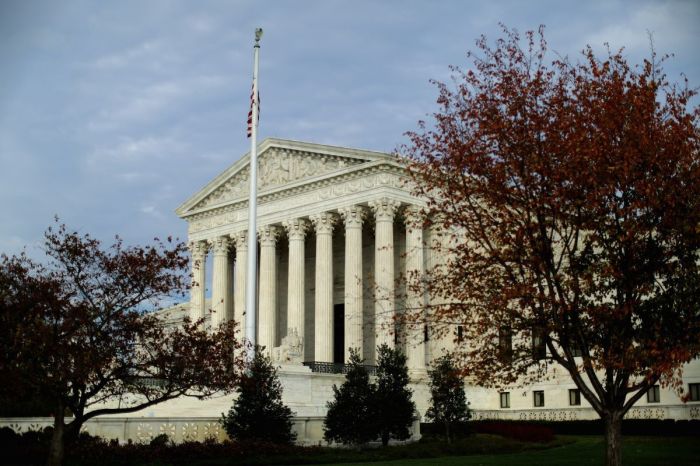
The U.S. Supreme Court has upheld the constitutionality of a Texas law that requires residents to go through an age verification process to access pornographic websites, as similar policies have been enacted by nearly half of the states in recent years.
The high court ruled 6-3 in the case of Free Speech Coalition et al. v. Paxton, Attorney General of Texas, that the law requiring pornography websites to use “reasonable age verification” methods to ensure users are old enough to access the material does not violate the U.S. Constitution.
Justice Clarence Thomas authored the majority opinion, joined by Chief Justice John Roberts, as well as Justices Samuel Alito, Neil Gorsuch, Brett Kavanaugh and Amy Coney Barrett.
“The power to require age verification is within a State’s authority to prevent children from accessing sexually explicit content,” wrote Thomas, saying that the state law “is a constitutionally permissible exercise of that authority.”
State governments can “proscribe outright speech that is obscene to the public at large,” Thomas noted, and they can “prevent children from accessing speech that is obscene to children.”
“Consistent with this history, our precedents recognize that States can impose greater limits on children’s access to sexually explicit speech than they can on adults’ access,” he continued.
“It follows that no person — adult or child — has a First Amendment right to access speech that is obscene to minors without first submitting proof of age. The power to verify age is a necessary component of the power to prevent children’s access to content that is obscene from their perspective.”
According to the Age Verification Providers Assocation, 24 states have enacted some kind of age-verification law since 2023, when Louisiana was the first to do so.
Justice Elena Kagan authored a dissent to the majority, being joined by Justices Sonia Sotomayor and Ketanji Brown Jackson.
While Kagan agreed that children should not be exposed to pornography, she believes that Texas’ law wrongfully interferes with adult access to pornographic websites.
“Texas’s law defines speech by content and tells people entitled to view that speech that they must incur a cost to do so. That is, under our First Amendment law, a direct (not incidental) regulation of speech based on its content — which demands strict scrutiny,” wrote Kagan.
“A statute tries to cut off children’s access to sexually explicit speech, in line with the most worthy objectives. But the statute as well impedes adults’ access to that speech, which the First Amendment protects.”
The ruling drew positive reactions from anti-sexual exploitation advocates and Christian conservative leaders.
Dani Pinter, senior vice president and director of the Law Center at the National Center on Sexual Exploitation, said in a statement that the ruling sets an “important precedent” because it enshrines age-verification laws as a “constitutional way to prevent children from accessing pornography online.”
Brent Leatherwood, president of the Southern Baptist Convention’s Ethics and Religious Liberty Commission, believes age-verification requirements are the “bare minimum we should expect in a nation that wants its youngest generations protected from a predatory and dehumanizing industry.”
“Upholding this law opens an avenue for other states and the federal government to develop smart policies that create a healthier online environment — an environment that prioritizes the family and respects human dignity. We urge lawmakers to do so swiftly,” he said in a statement.
In June 2023, Texas Gov. Greg Abbott signed House Bill 1181, which requires porn sites to verify a user’s age. Any company violating the law faces a fines of up to $10,000 daily.
In response to the law, Pornhub announced that it would block access to its website in Texas, claiming that HB 1181 was “ineffective, haphazard, and dangerous” and violated “the rights of adults to access protected speech.”
“While safety and compliance are at the forefront of our mission, providing identification every time you want to visit an adult platform is not an effective solution for protecting users online,” stated Pornhub.
“Attempting to mandate age verification without any means to enforce at scale gives platforms the choice to comply or not, leaving thousands of platforms open and accessible.”
The Free Speech Coalition, a group that supports the pornography industry, filed a complaint against Texas Attorney General Ken Paxton, and a three-judge panel of the 5th Circuit ruled 2-1 in March 2024 in favor of the age verification law, overturning a lower court decision that had blocked it.
“Applying rational-basis review, the age-verification requirement is rationally related to the government’s legitimate interest in preventing minors’ access to pornography,” wrote Circuit Judge Jerry E. Smith, a Reagan appointee, for the majority.
“The record is replete with examples of the sort of damage that access to pornography does to children. … That is far more than what is necessary to demonstrate that the legislature did not act irrationally.”
In late April 2024, the Supreme Court issued a one-sentence miscellaneous order declining to block enforcement of the Texas law while the legal proceedings continued.

















